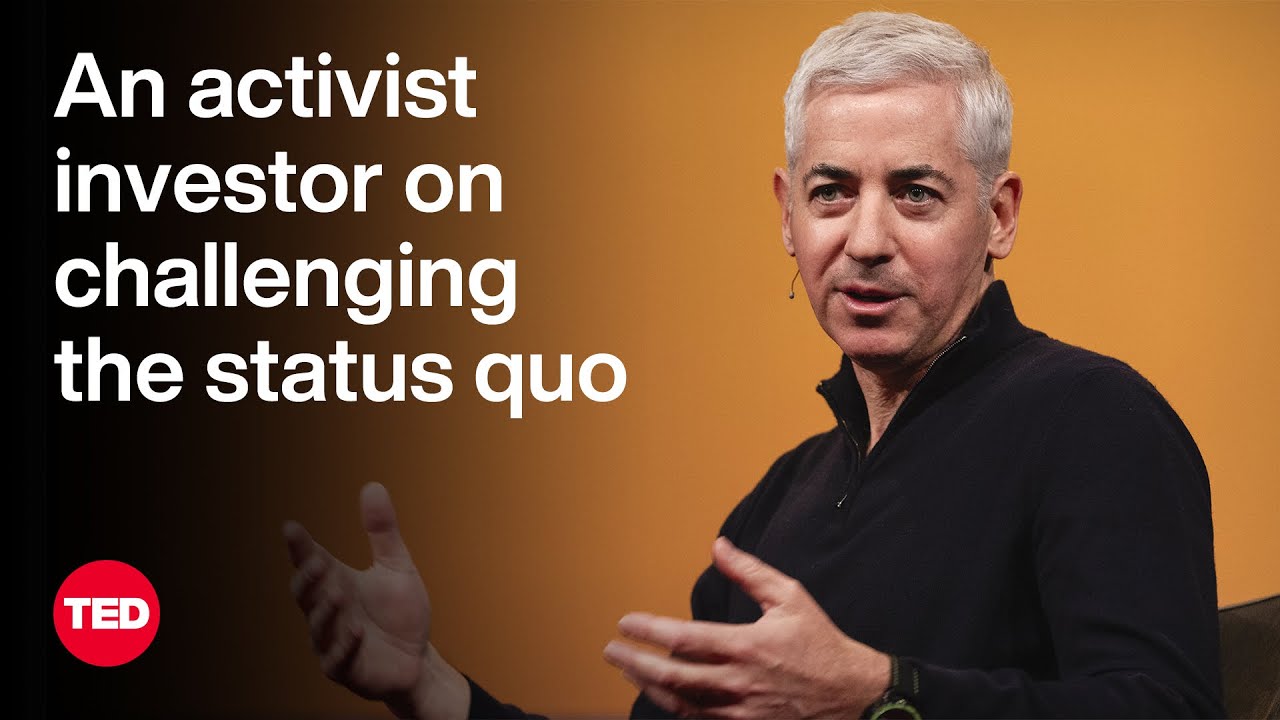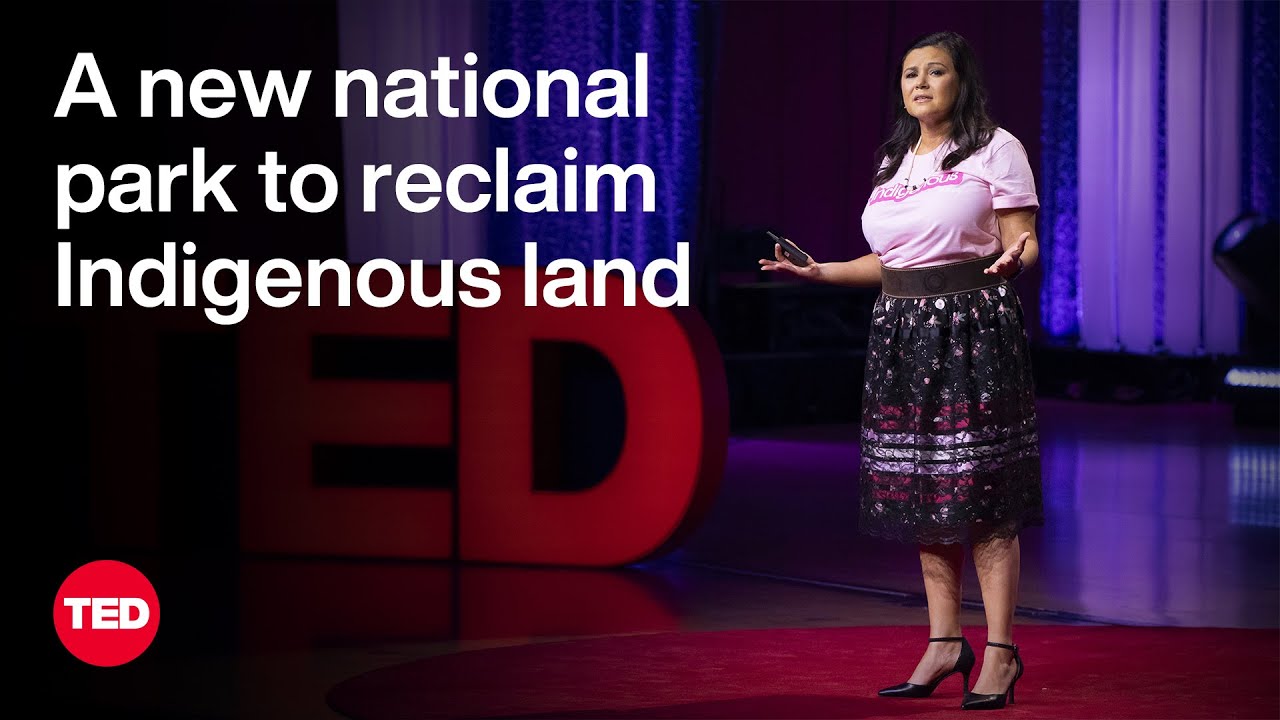Visit to get our entire library of TED Talks, transcripts, translations, personalized talk recommendations and more.
Think capitalism is broken? Try cooperativism, says co-op enthusiast and researcher Anu Puusa. She lays out how cooperatives — businesses owned, operated and controlled by their members — can both make money and have a positive impact on the environment and local communities. With co-ops, Puusa says, doing good business and doing good at the same time becomes possible.
The TED Talks channel features the best talks and performances from the TED Conference, where the world’s leading thinkers and doers give the talk of their lives in 18 minutes (or less). Look for talks on Technology, Entertainment and Design — plus science, business, global issues, the arts and more. You’re welcome to link to or embed these videos, forward them to others and share these ideas with people you know.
Become a TED Member:
Follow TED on Twitter:
Like TED on Facebook:
Subscribe to our channel:
TED’s videos may be used for non-commercial purposes under a Creative Commons License, Attribution–Non Commercial–No Derivatives (or the CC BY – NC – ND 4.0 International) and in accordance with our TED Talks Usage Policy (). For more information on using TED for commercial purposes (e.g. employee learning, in a film or online course), please submit a Media Request at
Transcriber:
I’m so happy and proud to be here.
When I told my husband
about this wonderful opportunity,
he said, “TED Talk? Wow,
I get to do that a lot around here.
It’s finally someone else’s turn.”
So, yes, I happen to be married
to a wonderful man named Ted,
which is pretty rare
in Finland, where I’m from.
It’s not a typical Finnish name
at all, trust me.
Myself, I’m a business professor,
and I love teaching.
But you know what?
My students are fed up,
they’re really fed up with the way
business is screwing up the environment
and making wealth inequality worse,
and putting money and profits
above all else.
And what really makes them mad
is when I tell them
about the cooperative movement.
They’re angry,
because once they understand
how cooperatives work,
they feel like a secret solution
has been kept hidden.
Before I tell you more
about why cooperatives are so great,
I want to explain what they are.
A cooperative is an organization
that is owned by its members,
who are also its customer
and decision maker.
And unlike most businesses,
where certain owners
can buy more power and influence,
in a cooperative,
every member has one vote,
which was a revolutionary idea
back when the model was first introduced.
A regular man, not to mention a woman,
with no significant means
or a prestigious position in a society,
as an owner, an equal partner in business?
Unheard of.
Perhaps it’s still a bit revolutionary.
Cooperatives exist in a sweet spot
between the for-profit
and nonprofit worlds.
Their uniqueness
is based on the idea of duality.
They have two distinct
but complementary roles.
On one hand,
they act like any other business
and try to make money.
But on the other hand,
cooperatives are and do so much more.
They are people-centered enterprises
run by and for their members,
and they try to achieve economical,
but also social and cultural goals
to benefit those members
who are just regular people,
like you and me.
And what has happened for almost 200 years
is that cooperatives have proven
to make decisions
with a view across generations,
instead of quarter-to-quarter,
to benefit more people
and to anchor wealth in communities
that might not otherwise
attract investment,
while still being
competitive and innovative.
Sounds pretty good, right?
I guess that’s why,
at the end of a class the other day,
a student, all red and jazzed up,
basically shouted at me.
“I’ve always been a straight A student,
done all the work, read all the books,
and now you’re telling me
that all my life,
I’ve missed hearing about a movement
with this magnitude?”
I get this a lot.
The organized cooperative movement
started in 1844,
with the [Rochdale Equitable
Pioneers’ Society].
This was a group of weavers and artisans
who, out of desperation,
opened a store together,
to sell things that they could
neither get nor afford alone.
The cooperative movement spread from there
and became a global phenomenon.
Many of the modern-day credit unions
and farm credit systems
you see in North America
are descendants of the famous
cooperative Raiffeisen system in Germany.
And here in Finland,
a man named Hannes Gebhard
is considered to be the father
of the Finnish cooperative movement.
In the 19th century,
he introduced cooperatives
to help people tackle debt,
poverty and unemployment.
It turns out this is the foundation
of a country known
for its democratic values,
high-quality education
and the happiness of its citizens.
And this line of impact
of the cooperative movement
can be found in other places
in the world too.
I’m proud to say that in relative terms,
Finland is one of the most cooperative
countries in the world.
We have about 5.5 million people
who have over seven million memberships
in cooperatives that run everything
from groceries to banks.
Each time I shop
at our grocery cooperative,
when I fill in my gas tank,
eat at our jointly owned
restaurants, stay at a hotel
or buy clothes or hardware stuff,
I get bonuses that can be
up to five percent.
And when I pay with
our cooperative’s bank card,
I get an additional half percent off.
And I know that when
the cooperative is doing well,
it’s not funding a single person’s
luxury vacation in the Bahamas.
Every year, a governance body
comprised of elected representatives
decides how any operating
surplus will be used.
Some of the money
will go back to the members.
For example, this year,
our consumer cooperative,
Pohjois-Karjalan Osuuskauppa,
or PKO, as we call it —
is part of the S Group,
which is the biggest
cooperative group in Finland —
they had a surplus of two percent
on members’ purchases,
and 12 percent return on money invested.
When you add up
the savings and the return,
my family received
more than 2,000 euros back,
which is more than we spend
on groceries in one month.
Not to mention that our groceries
are about seven percent cheaper
than its main competitor.
I’m a member-owner in three cooperatives,
and my husband has four memberships:
a consumer, a bank, an insurance
and a water cooperative.
We have two beautiful girls
who are 10 and 12 years old,
and they are also
member-owners of the S Group.
Their memberships cost us
one hundred euros each.
We want to pass on the legacy
and teach them about the benefits
of cooperatives early on.
And of course,
they are very happy
about the yearly interest
on cooperative capital.
But it’s not just about us
getting money back.
It’s about the greater good
for our community.
I’m not only talking
about taxes and employment,
even though our consumer cooperative
is the biggest employer in the area.
I’m talking about support
for young people, sports, arts,
university and cultural events.
For example,
as a member of the board of PKO,
a few years ago, we agreed to build
a sports hall for Lieksa,
which is a nearby city here,
in the eastern part of Finland,
belonging to our cooperative’s
operational area.
After we built it,
the city signed a very long-term
rental agreement with us,
so financially, the investment made sense.
And of course, it was a major gesture
to the local people,
who now have proper facilities
to do all kinds of sports.
In another case,
we ended up rejecting
the investment proposal
regarding building
a senior house downtown.
The idea was a very good one,
but we declined,
because it was a big housing complex
requiring a lot of capital
with a low expected investment return
that would only serve
a small part of the membership,
less than one percent
of our over 100,000 members,
and therefore, we decided against it.
In a cooperative,
if we only emphasize profitability,
the interests of the membership
may quickly become secondary.
On the other hand,
a situation where too much consideration
is given to the members’ differing
and changing interests
may jeopardize business performance.
So therefore, finding
a balance is important.
One role should not have
priority over the other.
Metaphorically speaking,
cooperatives, by nature,
have been given two solid feet,
and as you know, it’s much easier
to stand on two feet than on one foot.
Ensuring that is the board’s
most important task.
It is a very cool system.
That balance means
that cooperatives can help us
meet ambitious environmental goals.
In Finland, for example,
S Group aims at carbon negativity
by the year 2025.
REScoop.eu, a network of 1,900
energy cooperatives
with way over one million members,
is promoting community energy,
which is key to a decarbonized economy
and a crucial step
in tackling climate change.
This is about more
than windmills and solar panels.
Community energy can help overcome
the urban and rural divide
and close the gap between north and south,
between rich and poor,
because it empowers local people.
Community energy
leads to energy democracy,
holding the promise
of an economy and a society
based on cooperation
rather than competition
within the boundaries of planet Earth.
What is so wonderful
about the cooperative system worldwide
is that while cooperatives may sell
different products or services,
the goal is still the same
for all of them,
to create sustainable businesses
that benefit the people
and the communities they serve,
lasting for generations.
This is also a significant
global phenomenon,
an invisible giant of the economy,
resonating so well with the values
of regular people,
a form of business that recognizes
that we people have
other motivations and interests
than purely and only economical ones.
Today, there are more than three million
cooperatives around the world,
with over a billion members,
employing 280 million people,
which is 20 percent more
than multinational companies.
Cooperatives sell more
than two trillion dollars’ worth
of goods and services.
That number is larger
than the GDP of Canada.
Doing good business
and doing good at the same time
really makes an excellent match,
and this really works,
because it’s all about participation.
And while having lots of people
involved in any project
can often make things
a little bit more complicated,
we can also often get
better and fairer outcomes.
We can create better businesses,
if we truly include the people they serve.
When we Finns travel abroad,
we tend to brag about our sauna,
sisu, fresh air,
clean waters and endless forests.
And of course, that the real Santa Claus
comes from Finland.
But what we really should be
bragging about is our cooperatives.
Because unlike capitalism,
the cooperative movement is not broken.
It just needs better marketing.
Thank you.

 Science & Technology4 years ago
Science & Technology4 years ago
 Wired5 years ago
Wired5 years ago
 CNET4 years ago
CNET4 years ago
 Wired5 years ago
Wired5 years ago
 Wired5 years ago
Wired5 years ago
 Wired5 years ago
Wired5 years ago
 People & Blogs2 years ago
People & Blogs2 years ago
 Wired5 years ago
Wired5 years ago


















Brandon
May 27, 2021 at 5:02 pm
Most non profits are capitalist for profit shams in disguise
Nizil Shah
May 27, 2021 at 5:29 pm
See about Amul, an Indian milk cooperative. This coop model brought White Revolution in India.
Tiavor Kuroma
May 27, 2021 at 5:37 pm
every form of business has it’s place and not everything can be a coop. e.g. how is the liability with a coop? in a normal company only the owner is liable. in a coop it would be everyone I guess. Imagine giving every participant of a coop a 1 million dollar fine.
Niranjan Hanasoge
May 27, 2021 at 6:22 pm
You wrote _”In a normal company only the owner is liable”_ — in which country does that happen? In all other countries, the owners are *_not_* liable. That’s what *”limited liability”* means. Worst case scenario: The owners lose the money they’ve invested in that company. Nothing more. Same with cooperatives. All these organizations—corporations, cooperatives, partnerships, non-profits—are legal entities in and of themselves. As far as the law is concerned, they are equivalent to humans.
So, to answer your question, the cooperative itself is liable, not its owners, not its management. The management can be separately prosecuted and fined if they acted illegally, but not otherwise. If a cooperative is fined, say, 10 million dollars, the owners and the management are *_not_* required to pay it out of their own pockets. If the cooperative has the money, the cooperative pays the fine. Otherwise it is shut down and its assets are seized. The owners’ other assets are not touched.
This is exactly the same as with any other limited liability venture. It’s at the heart of capitalism.
Lev Marchuk
May 27, 2021 at 7:03 pm
if everyones the owner they wouldnt be fined on an individual basis dude
Guna Sekara Pandian S
May 27, 2021 at 5:39 pm
Here in Tamil Nadu, India when we talk about such concepts as a political manifesto people question us about possibility.
vynce
May 27, 2021 at 6:14 pm
the whole talk reminded me of a stewardess showing me my seatbelt and life vest. the content was good though
Pink Cat
May 27, 2021 at 6:52 pm
This is amazing 🙌🏻
Lev Marchuk
May 27, 2021 at 7:16 pm
Sadly the capitalists, as long as they are in power, will never allow for an organic transition to a cooperative market. They will buy out politicians and loosen regulations as they see necessary to protect their monopolies.
MrMakabar
May 28, 2021 at 1:11 pm
Just look up cooperative and your town or region you live in and if you live in a free market economy of any sort you will find some. Capitalist are not some evil folks schemeing to secretly rule the world. In fact by joing a cooperative you become a capitalist.
The issue is founding them as they are as risky to found as a normal company, but with out the economic reward.
Renier du Plessis
May 27, 2021 at 7:26 pm
Well done Professor – inspiring
Jake Lunsford
May 27, 2021 at 7:29 pm
Hey folks, magic is real. The magic universe is real. The magic people are super-geniuses. Anybody can become magical.
Doing magic is not illegal.
Every thought or action that we have comes from people in the magic universe.
I did magic once.
Also, telepathy is real.
The magic people are as hard to spot as CIA agents. Although, usually they aren’t people you’d consider losers.
Ellial
May 27, 2021 at 8:07 pm
Economic democracy is our future
SAMCA San Andreas
May 28, 2021 at 6:48 pm
Democracy is evil mob rule.
nice places
May 27, 2021 at 8:16 pm
Felt like a damn Davos talk
Overonator
May 27, 2021 at 9:28 pm
Co-operatives rock. It’s where the workers own the business and have an equal vote to how the business is run as everyone else who owns that business. Democracy in a workplace, almost an alien concept on the USA. I realize that there are other kinds of co-ops where there are still board of directors who are selected by workers/voters.
TORdankmeme
May 28, 2021 at 3:28 am
Did you literally not watch the first 1 minute of this video, co-ops are owned by its customers
Overonator
May 28, 2021 at 3:48 am
@TORdankmeme She said customers and members, I thought members were workers. I looked it up and not all cooperatives are owned and run by their workers.
Chromanyx
May 28, 2021 at 3:53 am
@TORdankmeme consumer co-ops are owned by the members, while worker co-ops are owned by the workers.
Both are good
Carson Hunt
May 28, 2021 at 5:34 am
The US doesn’t even have unions much anymore. We all like being easily replaceable wage slaves more because it helps the business make more money which matters most 🙄
Noeleen Donagher
May 27, 2021 at 9:44 pm
Kerrygold started out as a co-op, it became a company in the late 80s. Now is one of largest dairy companies in the world.
Random Things
May 27, 2021 at 10:06 pm
Comment algorithm
Random Things
May 27, 2021 at 10:07 pm
Engagment
Major Old Lady aka, Mom
June 1, 2021 at 7:13 pm
It was also engagING, lol.
Random Things
May 27, 2021 at 10:07 pm
Watch this video
Random Things
May 27, 2021 at 10:07 pm
CO-ops, MUST be known
Random Things
May 27, 2021 at 10:07 pm
Come on, watch this video!
Random Things
May 27, 2021 at 10:10 pm
Comment
Random Things
May 27, 2021 at 10:10 pm
Random boost
Ryan Erne
May 27, 2021 at 10:47 pm
Syndicalist here. ✊
Andromax BSE
May 28, 2021 at 4:08 pm
Hear hear
loloknight
May 28, 2021 at 1:27 am
Tienda de raya con membresía hmmm…
Sathya Narayanan
May 28, 2021 at 5:48 am
This talk inspired me to get start a co-op. I am not a businessman but I am into community service. I believe co-op is a wonderful way to balance economy and sustainable community development.
Madhan Mohan
May 28, 2021 at 8:11 am
NTK policy in tamilnadu.
Marry Johnson
May 28, 2021 at 8:31 am
I get my electric from a co-op in the USA. It is about half the cost of electricity from a regular company.
meroinheroin
May 28, 2021 at 8:25 pm
In FL we don’t even have the option to use a different electricity provider :/
Marry Johnson
May 29, 2021 at 7:11 am
@meroinheroin before I lived here, no provider would serve the town, so they started the co-op. Then the town grew to be a city. Then a bigger city. Now lots of companies want to seve the city, but we vote them down.
Justice Mob
May 30, 2021 at 1:43 pm
Same in the Philippines, The Manila has a private company called the Meralco, they ruthlessly charged people with very high electric bill. Meanwhile, in the Southern Philippines, my electricity consumption in the electric cooperative is the same but the price is 60% lower. Privatization of public service is really really bad.
Marry Johnson
May 30, 2021 at 3:34 pm
@Justice Mob Yeah. Privatization of any utility or public service is bad for everyone that does not own. The same is true For anything that is necessary for use by the masses.
Cam Adams
May 28, 2021 at 8:44 am
Very interesting concept.
I am moderately disturbed I have never heard, or seen, this concept anywhere (despite completing k-12, engineering undergrad, and minoring in economics).
I’ll definitely have to look into this some more
NSB Mart
May 28, 2021 at 9:45 am
Great speech
Gaasuba Meskhenet
May 28, 2021 at 12:58 pm
Don’t try to parasocial with me you rich
If you can, please help my soon to be evicted family
Only covid protections kept us safe before. Go fund me in the description of my videos
Emilia Fujiwara
May 28, 2021 at 5:42 pm
I feel the two book of Riane Eisler,
“The Chalice and The Blade” and “The Real Wealth of Nations: Creating a Caring Economics” explained those extraordinary success very practically and ideally. I’d like to recommend those book.
SAMCA San Andreas
May 28, 2021 at 6:47 pm
Co Ops won’t work until the hipsters inflate their prices to the point they’re no longer affordable. Once they become a status symbol they will be popular.
Howard Selby
May 29, 2021 at 6:29 pm
The UK Co-op group, best known for its grocers has been going for years, great shops.
Wiki: Co-op, is a British consumer co-operative with a diverse family of retail businesses including food retail and wholesale; e-pharmacy; insurance services; legal services and funeral care.They sold their banking interests in 2017.
TituSs Power
May 30, 2021 at 1:22 pm
nice
Joel Mwaura
May 31, 2021 at 3:22 am
A really great and insightful presentation.
Goolag Tube
June 1, 2021 at 12:55 pm
Yet the local electrical co-op around here is poisoning the land & groundwater through Bayer/Monsanto chemicals yet again…
Tomás Pereira
June 1, 2021 at 4:34 pm
Distributism rules!
Clifton Regis
June 3, 2021 at 1:23 pm
The popularity of Co-ops will definitely grow, as more people hear about them. It’s such a cool system and the complexity of governance should diminish as we get more experience. Peace, success, and love to all.